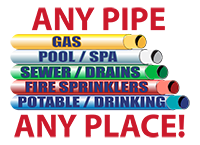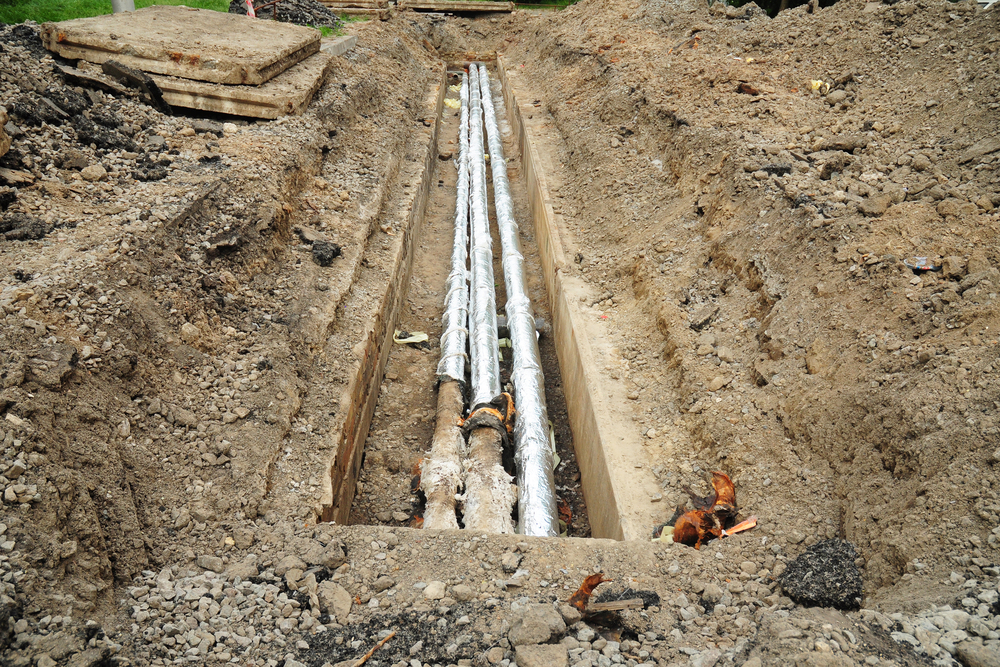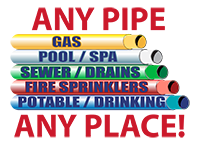How do sewer line problems arise?
Signs of sewer line problems in homes in San Diego can show up when there is a blockage in the sewerage system. It is important to note that all drains in San Diego homes are connected to a sewer line which is connected to the city’s main sewer through the sewer lateral. Sewer line problems occur when this framework gets disrupted due to a variety of reasons.
Sewer lines in San Diego homes can vary depending on the age of the property and the type of plumbing system installed. Many older homes in the city have original sewer lines made of cast iron or clay. These types of pipes work well but are more prone to corrosion, cracking, and collapse over time, leading to sewer line problems.
Also, San Diego’s warm climate and lush vegetation can make tree root intrusion a common sewer line problem for homeowners in the city. Trees and shrubs growing near the sewer line can cause roots to invade and clog the pipes, thereby leading to sewer line problems. Let us not forget the problem of bellied pipes, also known as sagging pipes. This occurs when a section of the sewer line sinks or dips, creating a low spot where waste and debris accumulate over time. This can cause backups, slow drains, and other sewer line problems.
Regular maintenance of sewer lines can prevent problems and extend the life of your home’s plumbing. When sewer line problems arise, you should contact a professional sewer pipe repairman who can perform regular inspections and clean your sewer line.
How to spot the signs of sewer line problems?
To solve common sewer line problems in your San Diego home, you should keep an eye on the signs. Plumbing can be an expensive affair, but early intervention can definitely prevent the problem from becoming more serious. In this blog, let’s take you through some common signs of sewer line problems so that you can call for expert assistance at the earliest.
#1 Slow or clogged drains
If you notice that your sinks, showers, or toilets are draining slowly or are frequently clogged, it could be a sign of a sewer line problem. Clogged drains are one of the most common sewer line problems. It can be caused by a variety of factors, including grease buildup, hair, soap scum, food waste, and foreign objects.
To prevent clogged drains, you should avoid pouring grease down the drain, using a drain strainer to catch hair and food debris, and flushing only toilet paper and human waste down the toilet. Regular maintenance such as periodic drain cleaning by a professional plumber can also help prevent clogs.
#2 Backups
If sewage is backing up into your home through your sinks, shower, or toilets, you might have a sewer line problem. Sewer backups can be caused by a blockage or damage to your home’s main or auxiliary sewer line. A sewer backup can cause raw sewage to back up into your home, which can cause significant damage and pose health risks to the occupants of a home.
If you have a sewer backup, avoid using water in your home until the problem is resolved. This includes flushing toilets, running water, and using appliances such as the dishwasher or washing machine. Raw sewage can contain harmful bacteria and viruses that can cause illness. Always wear protective clothing such as gloves and boots when dealing with a sewer backup, and keep children and pets away from the affected area.
#3 Foul odors
A strong sewer smell coming from your drains, toilets, or yard can be a common sign of sewer line problems in your San Diego home. Sewer lines carry wastewater away from your home and into the sewer system. When there is a problem with the sewer line, it can cause sewer gases to escape into your home or yard, which can create an unpleasant smell.
It is important to note that sewer smells can also be a sign of more serious problems, such as sewage backups or leaks. If you notice a sewer smell, it is important to address it promptly to prevent further damage to your sewer line and avoid potential health hazards. In such cases, it is best to contact a professional plumber or sewer technician to investigate the issue and make any necessary repairs.
#4 Gurgling Sounds
Gurgling sounds coming from your drains or toilets may indicate a sewer line problem in your home. These sounds can occur when air is trapped in the pipes due to blockages or other issues. These sounds can occur when air is trapped in the pipes due to blockages or other issues. When you flush a toilet or run water down a drain, it creates a vacuum that pulls air through the pipes. If there is a blockage or restriction in the pipe, air may become trapped and cause gurgling sounds as the water passes through.
Gurgling sounds may also occur if the sewer line is damaged or if there is a defect in the sewer vent system. The sewer vent system allows air to circulate through your plumbing system, and if it becomes blocked or damaged, it can cause air to become trapped in the pipes. If you notice gurgling sounds coming from your drains or toilets, it is important to act promptly. The problem may be minor, such as a clogged drain or vent, but it could also be a sign of a more serious issue with your sewer line.
#5 Soggy Lawn
A soggy lawn can be a sign of a problem with your sewer line. When there is a damage in the sewer line, it can cause sewage to leak into your yard, which can lead to a soggy or sunken lawn. If you notice a patch of grass in your yard that is constantly wet or has a foul odor, it could be a sign of a sewer line problem. You may also notice an increase in the number of insects or rodents in your yard, as they are attracted to the sewage.
Contacting a licensed plumber or sewer professional can help diagnose the issue and make any necessary repairs to your sewer line. In some cases, the damaged section of the line may need to be replaced, while in other cases, a repair may be possible. A professional can help determine the best course of action based on the specific situation.
#6 High Water Bills
If you notice a sudden increase in your water bill, it could be a sign of a problem with your sewer line. A leak in your sewer line can cause water to seep into the ground, leading to higher water bills. A leak in the sewer line can be caused by a variety of factors, such as age, shifting soil, or damage from invasive tree roots. The leak may be small, but even a small amount of water can add up over time and cause your water bill to increase.
It’s important to note that a sudden increase in water bills can also be caused by other factors, such as a malfunctioning water meter or a change in water usage habits. However, if you notice an unexplained increase in your water bill, it’s worth investigating to rule out any potential issues with your sewer line.
How to find the main sewer line in your San Diego home?
The main sewer pipe in San Diego city is typically located underground and is connected to the city’s municipal sewer system. The location can vary depending on the kind of property and the layout of your home’s plumbing system.
To locate your home’s sewer line, you should look at your home’s basement, creep space or carport. Look for a pipe that is about four inches in width and has a screw cap on the top with a square handle or indent at the top.
If you cannot spot the main sewer line in your home, it is possible that it is in your yard. Access points to sewer lines outside of the home can generally be situated your home’s foundations or close to the road. That’s where your home’s sewer lines meet the city’s line. If you are unsure about the location of your home’s main sewer line, you should contact a licensed plumbing company or sewer professional for assistance.
How to solve common sewer line problems?
There are several techniques to clear out sewer lines, depending on the severity of the blockage and the type of sewer line installed in your San Diego home.
- Hydro jetting: This is a common method for clearing out sewer lines. Hydro jetting involves using a high-pressure water stream, typically ranging from 3,500 to 4,000 psi, to break up and flush out debris and buildup in the sewer line. This technique is particularly effective for clearing out roots and other stubborn clogs. The hydro jetting machine uses a specialized nozzle that sprays water at a high pressure to blast away clogs and debris. The force and flow rates of the water stream can be adjusted depending on the severity of the clog and the type of pipe.
- Drain snakes or augers: Drain snakes or plumbing snakes are flexible cables that can be inserted into the sewer line to break up clogs and debris. These kind of equipment can be operated manually or by using a motorized machine. You have another option called augers, which are like drain snakes but have a drill-like end that can grind through tough clogs. Hand-operated augers are typically used for smaller clogs and can be operated manually by turning a crank to rotate the cable. Motorized augers are typically used for larger clogs and are powered by an electric motor or gas engine.
- Chemical drain cleaners: Chemical drain cleaners can be used to break up clogs in your home’s sewer line. However, they should be used with caution as they can damage the sewer line and are not environmentally friendly. They are typically sold as liquids, gels, or crystals and are readily available at most hardware stores and home improvement centers. Chemical drain cleaners may not be effective for all types of clogs, particularly those caused by tree roots or other hard materials.
- Sewer line camera inspection: Sewer line camera inspections can be used to identify the location and severity of clogs in the sewer line. The camera is inserted into the pipe and sends back live video footage to a monitor or display. This allows the technician to see the condition of the inside of the pipe and any obstructions or damage. This can help plumbers determine the best technique for clearing out the clog.
Choosing a professional plumbing company
It is important to note that attempting to clear out sewer lines yourself can be dangerous and may cause further damage to the sewer line. It is best to contact a licensed plumber or sewer professional who has the necessary expertise and equipment to clear out the sewer line safely and effectively.
Choosing a professional for sewer line maintenance or repair is an important decision, as the quality of the work can impact the safety and functionality of your plumbing system. Make sure the professional you choose is licensed and insured. They should have the necessary training and experience to perform the work, and that you are protected in case of any accidents or damage during the job.
Look for professionals who have experience working with sewer lines specifically. Ask for references and check reviews online to see what others have said about their work. Some sewer professionals may have additional certifications or training in specialized techniques or technologies, such as hydro jetting or trenchless pipe repair. Consider these qualifications when choosing a professional.
Are you looking for a professional to clear out your sewer lines problems? You can get in touch with us at San Diego Plumbing and Pipe Lining Company. We are one of the most experienced teams in the city.







